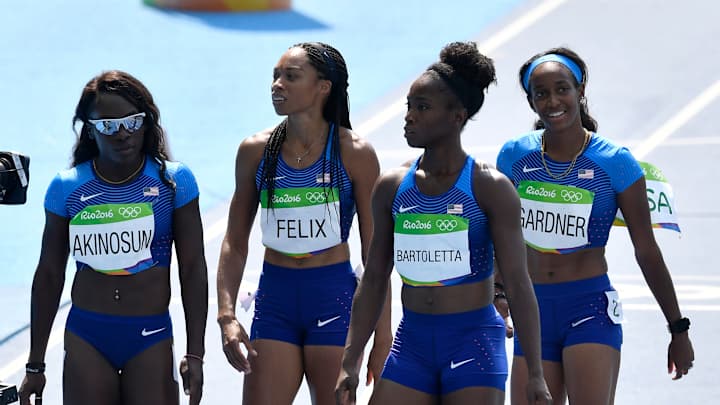A bobble leads to a rerun on another crazy day for US relays

RIO DE JANEIRO (AP) All by themselves on the massive track, the four U.S. women took their positions in Lane 2.
Tianna Bartoletta kneeled into the blocks and waited for the starter's pistol. It sounded and away she went - alone - in a first-of-its-kind Olympic relay race against the clock.
The Americans won that contest Thursday night to earn their spot in the final eight of the 4x100.
As is the case with so many relays the U.S. has run over the years, this was anything but routine.
''Our coach told us before we went out there, `It's just like practice, just the whole world will be watching,''' said English Gardner.
Returning to the track 7 1/2 hours after they left, the team of Bartoletta, Allyson Felix, Gardner and Morolake Akinosun finished in a time of 41.77 seconds to bump China out of the last spot in the final.
The rerun of their preliminary heat came about after Felix, running in the second position, got jostled by a Brazilian, stumbled and tried, unsuccessfully, to flip the baton ahead to Gardner.
The stick fell, and after being disqualified, the Americans lodged a successful protest.
But unlike some races, in which an additional runner could simply be added to the final, relays are limited to eight teams because there are only eight lanes that wrap completely around the track. So, the judges brought the Americans back to run in the same lane, in the same order, in what USA Track and Field said was the first rerun of its kind in Olympic history.
Their only goal was to beat China's eighth-place time of 42.70 seconds, and that was no problem for a team that had two members - Bartoletta and Felix - who were on the team that set the world record (40.82 seconds) at the London Games in 2012.
The exchanges were smooth, and a few moments after Akinosun crossed the line in a time that not only beat China's, but was the best that any team had run all day, the four runners huddled for a quick hug.
Bartoletta peeled off to receive the gold medal she won in the long jump the night before. The others were off for rest and another quick turnaround.
The final is Friday night, and the United States will run out of either Lane 1 or 8 - the least-desirable lanes because the Americans, despite their top time, were not among the top three finishers in their heat.
''I don't know how much more I can take,'' said Felix, whose season has been filled with injuries, disappointments and, now, this. ''My body's fine, my mind will be fine. It's different, just not the year I was expecting.''
Earlier, in more-conventional news, the U.S. men's team coasted through the preliminaries, winning its heat in 37.65 seconds. Jamaica's relay team also made it through, finishing second in its heat without Usain Bolt, who was resting up for the 200-meter final later in the evening.
It puts Jamaica, and Bolt, in position for a third straight title in the sprint relay.
''The only pressure is to make sure we get the stick'' around, said Asafa Powell, the former world-record holder who ran the third leg.
It's been more of a problem with the United States than the Jamaicans over the years.
The U.S. women botched the exchange in both the 2004 and 2008 Olympics to give away potential medals in an event that was virtually made for the team with the deepest pool of sprinters. At last year's world championships, a minor bobble in the less-technical 4x400 cost a precious split second that made the difference in a loss to Jamaica.
The U.S. men have either been disqualified or failed to get the baton around the track eight times at Olympics or world championships since 1995.
This year's men's team was in the holding room when the women bobbled the stick. A jarring reminder.
''First thing I did is told the young guys, `We got this,''' veteran Tyson Gay said after running the men's third leg. ''You've got to be positive. A lot of things happen out there.''
